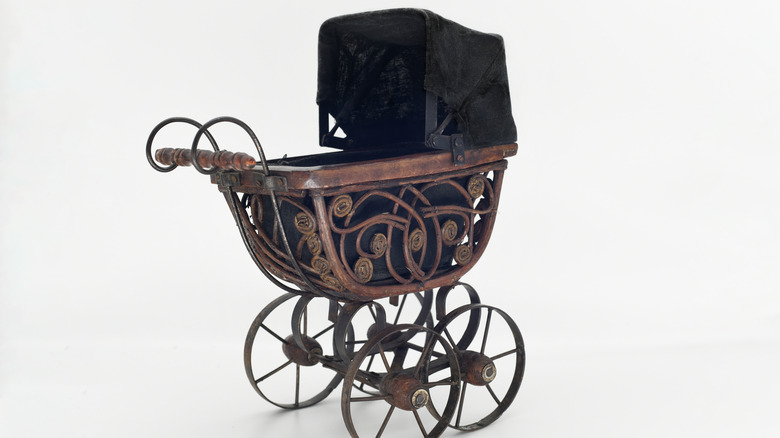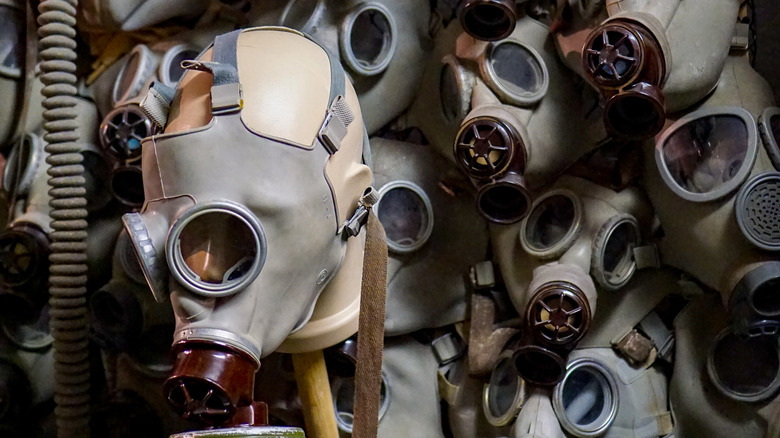Gas-Proof Strollers Were Invented In The 1930s For A Scary Reason
Countless times, painstakingly to the point of one's head nearly exploding, we've heard the phrase "unprecedented times" uttered over and over again throughout the course of the past two years. Granted, the COVID-19 pandemic did indeed wreak some unprecedented havoc upon our everyday lives, and it nearly robbed us of our collective sanity. However, when you look back on days long gone by, you have to wonder if all of that was really "unprecedented." Sure, by modern standards, a global catastrophe of such magnitude had pretty much been reserved for sci-fi movies up until March of 2020, but generations before ours had certainly endured their fair share of assaults upon everyday life.
Across the vast expanse of Europe, over 100,000 lives were lost to chemical warfare during World War I, according to the United Nations Office of Disarmament Affairs. It was the first time in history that harmful fumes and lethal chemicals like chlorine, phosgene, and mustard gas were used in combat. Chemical warfare's staggering effectiveness was devastating, and although it was primarily restricted to the battlefield, over 5,000 civilians died as a result of it (per the American Journal of Public Health, posted at the National Library of Medicine). So, when the faint silhouette of a second World War started to take shape during the 1930s, English citizens decided to get a jump-start on preparing for the worst. Enter gas-proof baby strollers (via Weird Universe).
The gas-resistant pram
Throughout the course of the 1930s, Great Britain was vigilantly cautious of the ever-ascending Nazi regime forging itself in Germany (as we now know, they had good reason to be trepidatious). World War I had concluded less than 20 years earlier, and the malicious use of chemical gases still hung in the fog of the nation's unsavory memories. According to Atlas Obscura, the British public had all been supplied with gas masks and were prompted to wear them throughout the day in order to prepare for the worst.
But what's preparation without a little innovation? For the everyday mother-baby duo that enjoyed taking afternoon walks together down the streets of their quiet local neighborhood, F.W. Mills crafted a clever little device that accommodated any threat of German chemical warfare. A gas-resistant stroller that sealed the baby within the compartment while also allowing for ventilated airflow was one of the early 20th century's more bizarre inventions that, thankfully, never had to be put to any serious use (per Listverse).
How did the gas-proof stroller work?
The gas-proof pram designed and distributed throughout England by F.W. Mills had certain features that were as impressive as they were disturbing, given what prompted their necessity. It was bulky and metal-coated, complete with a little glass window on its upper lid through which mamma and baby could make funny faces back and forth while out for a walk, as Listverse reports.
There was also a simple yet effective system that pushed fresh air into the compartment via a small motor horn bulb fastened to the back of the apparatus so the baby wasn't at risk of suffocating or being trapped in a capsule of its own carbon dioxide (via Listverse). A filter removed gas from air entering the device. It's a good thing that the practice of its intended use never came to fruition. It really was a creepy little mechanism. Ironically, for something that was designed to save an infant's life, it looked far too much like a baby coffin on wheels.


